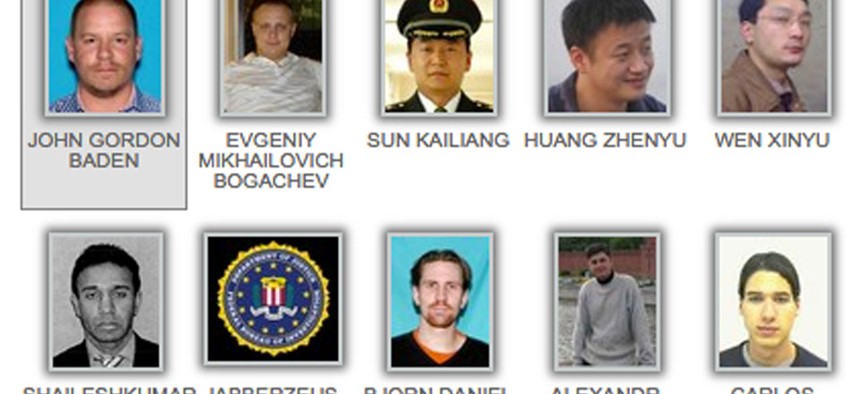FBI’s Most Wanted Hackers: A Bingo Buff, Chinese Military Members and a PI for the Brokenhearted

FBI
Pulling them from the keyboard likely won’t dent cybercrime, research indicates.
Five Chinese nationals, a bingo player and the mastermind of a spyware service for abandoned lovers were some of the fugitives spotlighted on the FBI’s Cyber's Most Wanted list, in recognition of October's Cybersecurity Awareness Month.
The FBI has put a collective $445,000 bounty on the heads of some of the nearly 30 sought-after hackers, many of whom are holdovers from last year’s list.
On Tuesday, the bureau specifically put out an APB for the following cyber outlaws:
- Wang Dong, Sun Kailiang, Wen Xinyu, Huang Zhenyu and Gu Chunhui, members of China’s People’s Liberation Army, charged with hacking the networks of six U.S. companies and stealing intellectual property.
- New Yorker John Gordon Baden, who, operating from Tijuana, allegedly pinched the identities of 40,000 U.S. mortgage applicants and then used their personal information to draw funds for expensive electronics. He enjoys gambling and playing bingo, according to his FBI wanted poster. Baden allegedly hacked into a U.S. mortgage broker's computers to obtain his victims’ applications.
- Evgeniy Mikhailovich Bogachev, wanted for installing "Zeus," a type of malware that steals banking credentials, on the computers of unknowing victims to make unauthorized money transfers.
- Carlos Enrique Perez-Melara allegedly ran a private investigator service that offered brokenhearted customers a means to catch cheating partners. Potentially thousands of targets received spyware-laced e-greeting cards. The surveillance gear then recorded keystrokes and other incoming and outgoing electronic communications for a dossier that was emailed to clients.
- Noor Aziz Uddin and Farhan Ul Arshad are wanted for breaching corporate phone systems to bilk individuals, companies and government agencies around the world out of more than $50 million.
Pulling these individuals away from the keyboard, however, likely won't stop their alleged schemes. Competitors will simply gain more business, according to recent research.
"One reason takedowns only temporarily affect the black markets is that even if a tool, forum, group or individual gets taken down, the vast majority of what is used does not get taken down, too," states a March study by the nonprofit Rand Corporation.
Hacking tools and techniques typically are not proprietary and sometimes get leaked on the Internet.
After the developer of the "Blackhole" hacker toolkit was arrested in October 2013, 25 similar kits popped up almost immediately afterward and are still available, the researchers found.
"The hacker economy has proved to be quite resilient," according to Rand.
Another reason the captures might not have much of an impact is that hacker havens such as Russia and China, which condone the activity, often are unwilling to aid authorities, the researchers said.
This summer, the Russian Foreign Ministry accused the United States of kidnapping Roman Seleznev, when U.S. officials extradited the alleged credit-card-number thief from the Maldives to America. Seleznev, the son of a Russian lawmaker, is accused of breaking into the payment card systems of U.S. businesses to extract financial data and sell it on the underground Web for profit.
Still, some overseas partnerships have aided prosecutions and the United States has FBI outposts throughout the world.
Federal cyber officials chant “international collaboration” and “information-sharing” whenever they speak publicly.
And they are expected to do so today and tomorrow, when INTERPOL and the French Minister of the Interior host a closed-door cybercrime forum in Washington, D.C. on Tuesday. About 30 U.S. and European officials, industry members and security experts are scheduled to attend discussions on cybersecurity and the law.






